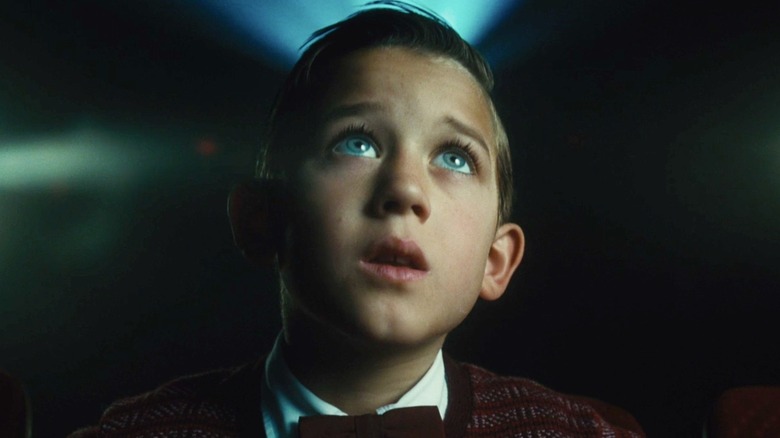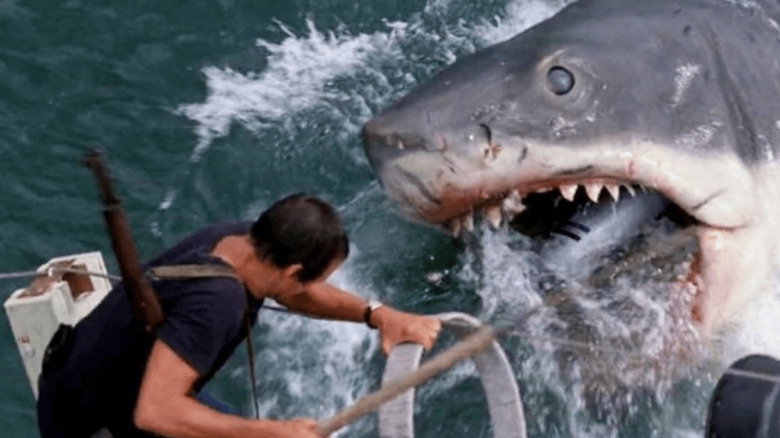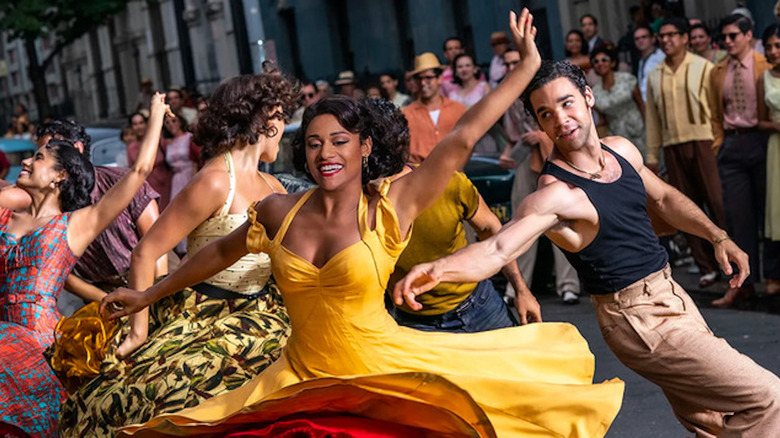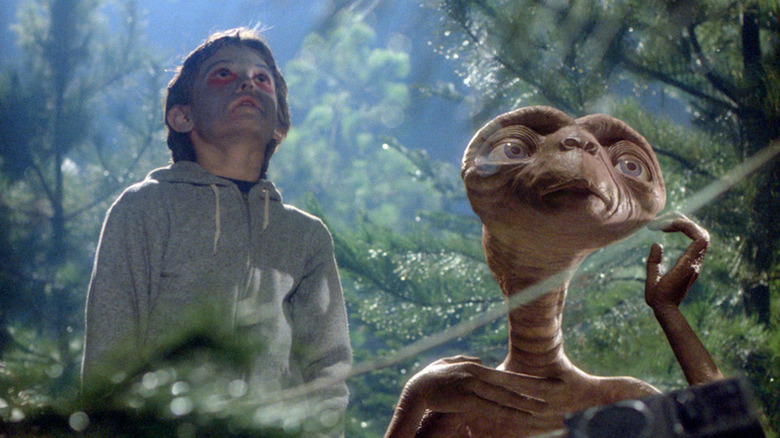Why Does Sight And Sound's Greatest Movies List Always Snub Steven Spielberg?
Every 10 years, the British Film Institute's Sight and Sound magazine asks hundreds of film critics to name what they believe to be the 10 greatest movies of all time. From this, a master list of the 100 Greatest Films of All Time is compiled. Once released, there's a brief period of effusion followed by days of rage. How could "[insert masterpiece here]" rank below so many films that are clearly inferior, or, god forbid, miss the list entirely? For some, the final list is too esoteric while others find the list too beholden to tradition. Many correctly point out that there's historically been a decided caucasian male slant.
The BFI addressed this last complaint in 2022 by expanding its scope from 846 critics to 1,639. This broadening of perspectives has resulted in what is easily the most racially and ethnically diverse list in the poll's 70-year history. Films from Ousmane Sembène ("Black Girl"), Julie Dash ("Daughters of the Dust"), and Charles Burnett ("Killer of Sheep") are all welcome additions. There are also four movies from the last decade ("Get Out," "Moonlight," "Parasite" and "Portrait of a Lady on Fire"). If the BFI wanted a list that eschewed the perceived stodginess of previous polls, mission accomplished.
The full list of participating critics hasn't been released, but the slight recency bias (unusual for the poll since its 1972 iteration, when several 1960s films cracked the top 100) suggests that many of the new respondents were likely born after 1980. If so, this would explain why numerous Hollywood classics from the 1930s and '40s dropped out of the list entirely.
What this doesn't quite explain, however, is the continued absence of a single Steven Spielberg movie from the top 100. Even though he's widely considered to be one of the greatest filmmakers in the history of the medium, the director has never cracked the list. Why is that? I've got some theories.
Hollywood loves a success, within reason
First of all, no one should weep for Steven Spielberg. His place in the filmmaking firmament is secure. He invented the summer blockbuster with "Jaws" in 1975, and earned the undying loyalty of an entire generation of film buffs via masterfully constructed escapist yarns like "Close Encounters of the Third Kind," "Raiders of the Lost Ark" and "E.T. the Extra-Terrestrial." He pursued the love of his life, and it made him a very wealthy man.
Still, Spielberg's always been subject to a bit of snobbishness. The Chicago Reader's Dave Kehr once dinged "Jaws" for "proving that actors and characters were completely redundant in the shopping center cinema of the '70s" (a wild misread of the movie that made me a cinephile). And while his films were too acclaimed and financially successful for the Academy Awards to ignore, he wouldn't win a competitive Oscar until he took on the gravely serious "Schindler's List" in 1993.
When it comes to the Sight and Sound list, the timing has never been in his favor. For whatever reason, there's not a single 1970s movie on the magazine's 1982 list, which suggests there was some kind of critical hostility to the New Hollywood movement at that point. If "The Godfather" or "Taxi Driver" couldn't pierce the top 100, "Jaws" and "E.T." had no shot. 10 years later, Spielberg was mired in a creative slump after the shrugged-off "Always" and hideously misconceived "Hook." Skip ahead to 2002, and he was smarting from the (wrongly) bewildered reaction to "A.I. Artificial Intelligence." In 2012, he'd returned from a three-year layoff to deliver "The Adventures of Tintin" and "War Horse," both lovely films, but far from peak Spielberg.
Sometimes empathy isn't enough
2022 should've been different, but, let's face it, we're in a really weird, transitional place when it comes to processing art. Spielberg's rendition of Leonard Bernstein and Stephen Sondheim's "West Side Story," with a huge assist from screenwriter Tony Kushner, found contemporary resonance in a tale of rival factions committed to acting out a never-ending tragedy. It was also exhilaratingly light on its feet for a filmmaker of any age, let alone one in his mid-70s. Like many of my peers, I was captivated, and, subsequently, stunned when it lost Best Picture to the perfunctorily directed Afterschool Special drama of "Coda."
At issue for some viewers was the fact that, yet again, two white men were addressing a racially charged conflict they had not personally experienced. Spielberg, who'd caught cultural shrapnel in the past for "The Color Purple" and "Amistad," could only let the work speak for itself. A newly diverse batch of Academy voters spoke as well. The film's sole Oscar, out of seven nominations, went to Ariana DeBose, a Puerto Rican performer who breathed bold new life into the Puerto Rican character of Anita (which, 60 years prior, earned Puerto Rican Rita Moreno the same award).
Movies are empathy machines
While I believe Spielberg's top five movies ("Jaws," "Close Encounters of the Third Kind," "Raiders of the Lost Ark," "Empire of the Sun" and "A.I. Artificial Intelligence") are, objectively, more masterfully crafted than many of the movies that made Sight and Sound's 2022 cut, on an emotional level — it's a stacked deck. I was a late-blooming white kid born in 1973 who got repeatedly chided by his parents for being too obsessed with movies. It's not that I lack empathy ("Do the Right Thing" is a forever top-five movie for me), but I do have my own bias — as does everyone who responded. They haven't released individual lists yet, but I guarantee many of the older white critics I grew up reading will have at least one Howard Hawks, Ernst Lubitsch, Anthony Mann, or, holy hell, David Lean film in their top ten ("Lawrence of Arabia" dropping out off the Sight and Sound list might be more stunning than the snubbing of Spielberg). Similarly, I bet we'll find votes for Melvin Van Peebles' "Sweet Sweetback's Baadasssss Song," Gina Prince-Bythewood's "Beyond the Lights" and S.S. Rajamouli's "RRR."
But the old guard and the new guard will always be skeptical of Spielberg for very different reasons. Depending on your age, he's either a shameless sentimentalist or an over-praised elder statesman. I think he's one of the greatest to ever do it, but I grew up under clear, small-town Ohio skies hoping to catch a shooting star. We all dream differently and engage with movies accordingly.



